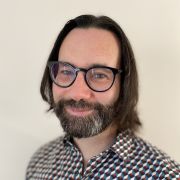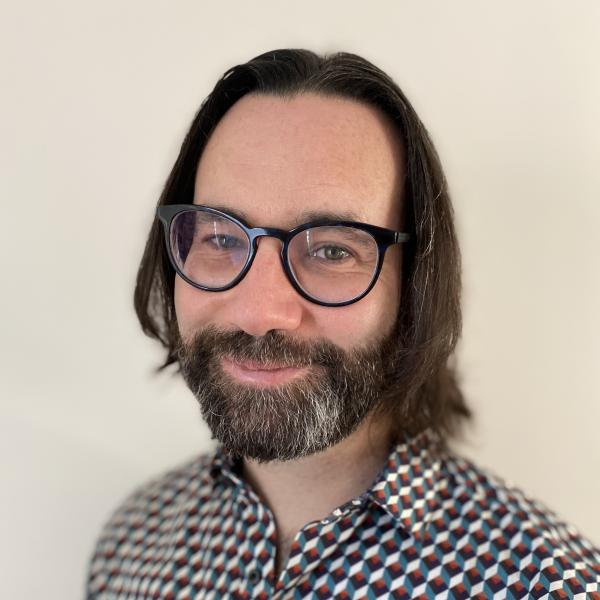Professor Earl Campbell
School of Mathematical and Physical Sciences
Professor of Quantum Computation


Full contact details
School of Mathematical and Physical Sciences
Hicks Building
Hounsfield Road
Sheffield
S3 7RH
- Profile
-
The quintessentially quantum features of nature are superposition and entanglement of quantum states.
I am interested in how these properties can be exploited to realise practical quantum technologies with capabilities beyond those allowed by classical, pre-20th century understanding of physics. See the research tab for more information.
My research team has one postdoc (Mark Howard) and one PhD student (Luke Heyfron).
Career history
- Research Fellow funded by Royal Commission of Great Exhibition of 1851 (2008-2010, University College London)
- Research Associate (2010-2013, Potsdam University and Frei University Berlin, Germany)
- Research Associate (2014-2015, University of Sheffield)
- EPSRC early career Research Fellow (2015-, University of Sheffield)
- Qualifications
-
- Physics & Philosophy MSc (2001-2005, Bristol University)
- Quantum computing PhD (2005-2008, Oxford University)
- Research interests
-
- Architectures for fault-tolerant quantum computing
- Topological error correcting codes
- Magic states
- Gate synthesis
- Majorana fermions and anyonic quantum computing
- Non-locality and foundations of quantum mechanics
- Qudit quantum computation
The central question behind my research programme is 'What are the optimal blue-prints for large-scale, reliable quantum technologies?'.
My main focus is fault-tolerance of quantum computation. My group designs protocols and software needed to operate future quantum computers, ensuring they would work reliably despite noise and decoherence.
This includes development of error correction codes and decoders, design of magic state factories and compilation of algorithms into machine level commands.
Magic state factories determine the processing speed of a quantum computers, so can be considered analogous to the CPU of conventional devices.
- Publications
-
Show: Featured publications All publications
Featured publications
Journal articles
- Random Compiler for Fast Hamiltonian Simulation. Physical Review Letters, 123(7), ---.


- Application of a Resource Theory for Magic States to Fault-Tolerant Quantum Computing. Physical Review Letters, 118. View this article in WRRO


- Unifying Gate Synthesis and Magic State Distillation. Physical Review Letters, 118. View this article in WRRO


- Enhanced Fault-Tolerant Quantum Computing in d-Level Systems. Physical Review Letters, 113(23).


All publications
Journal articles
- Unlocking early fault-tolerant quantum computing with mitigated magic dilution. Quantum Science and Technology, 10(4). View this article in WRRO


- Quantum computation of electronic structure with projector augmented-wave method and plane wave basis set. Journal of Chemical Theory and Computation, 21(15), 7360-7377. View this article in WRRO


- To reset, or not to reset—that is the question. npj Quantum Information, 11(1). View this article in WRRO


- A real-time, scalable, fast and resource-efficient decoder for a quantum computer. Nature Electronics, 8(1), 84-91. View this article in WRRO


- Reducing the error rate of a superconducting logical qubit using analog readout information. Physical Review Applied, 22(4). View this article in WRRO


- Tangling schedules eases hardware connectivity requirements for quantum error correction. PRX Quantum, 5(1). View this article in WRRO


- Block-encoding structured matrices for data input in quantum computing. Quantum, 8, 1226-1226. View this article in WRRO


- Statistical phase estimation and error mitigation on a superconducting quantum processor. PRX Quantum, 4(4). View this article in WRRO


- Parallel window decoding enables scalable fault tolerant quantum computation. Nature Communications, 14(1). View this article in WRRO


- Improved decoding of circuit noise and fragile boundaries of tailored surface codes. Physical Review X, 13. View this article in WRRO


- Bias-tailored quantum LDPC codes. Quantum, 7. View this article in WRRO


- Hierarchies of resources for measurement-based quantum computation. New Journal of Physics, 25.


- Tailoring term truncations for electronic structure calculations using a linear combination of unitaries. Quantum, 6. View this article in WRRO


- Trade-offs on number and phase shift resilience in bosonic quantum codes. IEEE Transactions on Information Theory, 67(10), 6644-6652. View this article in WRRO


- Single-shot error correction of three-dimensional homological product codes. PRX Quantum, 2(2).


- Quantifying quantum speedups: improved classical simulation from tighter magic monotones. PRX Quantum, 2(1). View this article in WRRO


- Tight bounds on the simultaneous estimation of incompatible parameters. Physical Review X, 11(1). View this article in WRRO


- Efficient quantum measurement of Pauli operators in the presence of finite sampling error. Quantum, 5.


- Decoding across the quantum low-density parity-check code landscape. Physical Review Research, 2(4). View this article in WRRO


- Lower bounds on the non-Clifford resources for quantum computations. Quantum Science and Technology, 5(3). View this article in WRRO


- Compilation by stochastic Hamiltonian sparsification. Quantum, 4, 235-235. View this article in WRRO


- Simulation of quantum circuits by low-rank stabilizer decompositions. Quantum, 3. View this article in WRRO


- Random Compiler for Fast Hamiltonian Simulation. Physical Review Letters, 123(7), ---.


- Applying quantum algorithms to constraint satisfaction problems. Quantum, 3.


- Quantifying magic for multi-qubit operations. Proceedings of the Royal Society A: Mathematical, Physical and Engineering Sciences, 475(2227).


- A theory of single-shot error correction for adversarial noise. Quantum Science and Technology, 4(2). View this article in WRRO


- An efficient quantum compiler that reduces T count. Quantum Science and Technology, 4(1). View this article in WRRO


- Magic state parity-checker with pre-distilled components. Quantum, 2. View this article in WRRO


- Hyperbolic and semi-hyperbolic surface codes for quantum storage. Quantum Science and Technology, 2(3). View this article in WRRO


- Optimal Quantum Metrology of Distant Black Bodies. Quantum, 1, 21-21. View this article in WRRO


- Cellular automaton decoders of topological quantum memories in the fault tolerant setting. New Journal of Physics, 19. View this article in WRRO


- Shorter gate sequences for quantum computing by mixing unitaries. Physical Review A, 95(4). View this article in WRRO


- Quantum computation with realistic magic-state factories. Physical Review A - Atomic, Molecular, and Optical Physics, 95. View this article in WRRO


- Application of a Resource Theory for Magic States to Fault-Tolerant Quantum Computing. Physical Review Letters, 118. View this article in WRRO


- Unified framework for magic state distillation and multiqubit gate synthesis with reduced resource cost. Physical Review A, 95. View this article in WRRO


- Unifying Gate Synthesis and Magic State Distillation. Physical Review Letters, 118. View this article in WRRO


- An efficient magic state approach to small angle rotations. Quantum Science & Technology, 1. View this article in WRRO


- Renormalizing Entanglement Distillation. Physical Review Letters, 116(2). View this article in WRRO


- Cellular-automaton decoders for topological quantum memories. npj Quantum Information, 1. View this article in WRRO


- Qudit color codes and gauge color codes in all spatial dimensions. Physical Review A, 92(2).


- Enhanced Fault-Tolerant Quantum Computing in d-Level Systems. Physical Review Letters, 113(23).


- Order 3 symmetry in the Clifford hierarchy. Journal of Physics A: Mathematical and Theoretical, 47(45), 455302-455302.


- Majorana fermions and non-locality. Quantum Information and Computation, 14(11-12), 981-995.


- AN INTRODUCTION TO ONE-WAY QUANTUM COMPUTING IN DISTRIBUTED ARCHITECTURES. International Journal of Quantum Information, 08(01n02), 219-258.


- HOW TO EXPLOIT LOCAL INFORMATION WHEN DISTILLING ENTANGLEMENT. International Journal of Quantum Information, 08(01n02), 161-180.


- Error-corrected Hadamard gate simulated at the circuit level. Quantum, 8, 1394-1394.


- Roads towards fault-tolerant universal quantum computation. Nature, 549, 172-179. View this article in WRRO


- Fast decoders for qudit topological codes. New Journal of Physics, 16(6), 063038-063038.


- Continuous-variable entanglement distillation and noncommutative central limit theorems. Physical Review A, 87(4).


- Magic-State Distillation in All Prime Dimensions Using Quantum Reed-Muller Codes. Physical Review X, 2(4).


- Qutrit magic state distillation. New Journal of Physics, 14(6), 063006-063006.


- Gaussification and Entanglement Distillation of Continuous-Variable Systems: A Unifying Picture. Physical Review Letters, 108(2).


- Catalysis and activation of magic states in fault-tolerant architectures. Physical Review A, 83(3).


- Non-adaptive measurement-based quantum computation and multi-party Bell inequalities. New Journal of Physics, 13(2), 023014-023014.


- Optimal entangling capacity of dynamical processes. Physical Review A, 82(4).


- Bound States for Magic State Distillation in Fault-Tolerant Quantum Computation. Physical Review Letters, 104(3).


- Measurement-Based Entanglement under Conditions of Extreme Photon Loss. Physical Review Letters, 101(13).


- Distributed quantum-information processing with minimal local resources. Physical Review A, 76(4).


- Efficient growth of complex graph states via imperfect path erasure. New Journal of Physics, 9(6), 196-196.


- Adaptive strategies for graph-state growth in the presence of monitored errors. Physical Review A, 75(4).


Conference proceedings
- Reducing the Error Rate of a Superconducting Logical Qubit using Analog Readout Information. 2024 IEEE International Conference on Quantum Computing and Engineering (QCE) (pp 382-383), 15 September 2024 - 20 September 2024.


- Tangling Schedules Eases Hardware Connectivity Requirements for Quantum Error Correction. 2023 IEEE International Conference on Quantum Computing and Engineering (QCE) (pp 342-343), 17 September 2023 - 22 September 2023.


- A Highly Efficient QEC Decoder Implemented on FPGA and ASIC. 2023 IEEE International Conference on Quantum Computing and Engineering (QCE) (pp 375-376), 17 September 2023 - 22 September 2023.


- Mind the gap: achieving a super-Grover quantum speedup by jumping to the end. Proceedings of the 55th Annual ACM Symposium on Theory of Computing (pp 1131-1144). Orlando, Florida, 20 June 2023 - 20 June 2023. View this article in WRRO


- The role of multiplicative complexity in compiling Low T-count Oracle circuits. 2019 IEEE/ACM International Conference on Computer-Aided Design (ICCAD). Westminster, CO, USA, 4 November 2019 - 7 November 2019.


- Optimising trotter-suzuki decompositions for quantum simulation using evolutionary strategies. GECCO '19: Proceedings of the Genetic and Evolutionary Computation Conference (pp 1223-1231). Prague, Czech Republic, 13 July 2019 - 13 July 2019. View this article in WRRO


- Decoherence in open majorana systems. Leibniz International Proceedings in Informatics Lipics, Vol. 44 (pp 111-126)


- On the Structure of Protocols for Magic State Distillation (pp 20-32)


Preprints
- To reset, or not to reset -- that is the question.


- Trade-offs on number and phase shift resilience in bosonic quantum codes, arXiv.


- Quantifying quantum speedups: improved classical simulation from tighter magic monotones, arXiv.


- Tight bounds on the simultaneous estimation of incompatible parameters, arXiv.


- Compilation by stochastic Hamiltonian sparsification, arXiv.


- Lower bounds on the non-Clifford resources for quantum computations.


- Simulation of quantum circuits by low-rank stabilizer decompositions.


- Magic state parity-checker with pre-distilled components.


- Random Compiler for Fast Hamiltonian Simulation. Physical Review Letters, 123(7), ---.
- Grants
-
- EPSRC early career fellow project "Towards fault-tolerant quantum computing with minimal resources." EP/M024261/1 value: £675,867
- Royal Commission of Great Exhibition of 1851 fellowship funding. value: ~£100,000
- Teaching activities
-
- PHY101 Academic tutor
- 3rd and 4th year project supervisor
- Professional activities and memberships
-
- Active member of EPSRC Peer Review College.
- Institute of Physics QQQ (Quantum Optics, Quantum Information and Quantum Control) group Committee.
- Organiser of FTQT2016 (Fault-tolerant quantum technologies) workshop in Benasque, Spain.
